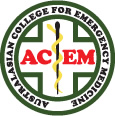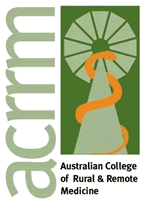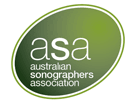
The Australasian College for Emergency Medicine (ACEM) is an incorporated educational institution whose prime objective is the training and examination of specialist emergency physicians for Australia and New Zealand and the ongoing Maintenance of Professional Standards of the Fellows.

The Australasian Society for Ultrasound in Medicine (ASUM) is a multidisciplinary society whose primary role is to assist in disseminating scientific information, provide education and set standards of practice in this continually developing specialty.

The Australian and New Zealand College of Anaesthetists (ANCA) has a proud record of promoting professional standards and patient safety in the many areas of anaesthesia, intensive care and pain medicine. It does this through education in the science and practice of anaesthesia, intensive care and pain medicine.

The Australian College of Rural and Remote Medicine (ACRRM) is the peak professional organisation for Rural and Remote Medicine (RRM) education and training in Australia and leads the world in the development of this discipline. Our members are committed to providing the highest quality of medical care to patients in regional, rural and remote communities throughout Australia.

The Australian Sonographers Association (ASA) was formed in 1992 in response to the desire of Sonographers across Australia for an organisation which had as its charter, to exclusively consider the issues confronting and challenging Sonographers in the modern environment. The ASA now has a membership of 2,200, almost all Sonographers and 40 corporate members whose support is greatly appreciated. The ASA has pledged to pursue high standards within the practice of Medical Sonography.

The core business of CRANAplus is to Educate, Support and Advocate for all health professionals working in the remote sector of Australia. CRANAplus are the only member based, National health organisation that has remote health as its sole focus, making us the remote health experts. This specialisation allows them to provide the unique education and support that is vital for staff to be equipped and able to remain within the remote health workforce

The College of Intensive Care Medicine Australia and New Zealand (CICM) is the peak body for intensive care medicine specialist training and education in Australia and New Zealand. The College offers a six year diploma of training and examination, culminating in Fellowship of the College of Intensive Care Medicine (FCICM). A paediatric intensive care endorsement is also offered. The College represents over 600 intensive care medicine specialists. Its headquarters is located in Melbourne, with regional committees throughout Australia, and national committees in New Zealand and Hong Kong.

The Royal Australasian College of Physicians (RACP) is a diverse and energetic organisation responsible for training, educating and representing over 9,000 physicians and paediatricians in Australia and New Zealand.

The Royal Australasian College of Surgeons (RACS), formed in 1927, is a non-profit organisation training surgeons and maintaining surgical standards in Australia and New Zealand. Approximately 90 per cent of all surgeons practising in Australia and New Zealand are Fellows of the RACS (FRACS).
![]()
The Royal Australian and New Zealand College of Obstetricians and Gynaecologists (RANZCOG) is dedicated to the establishment of a high standard of practice in obstetrics and gynaecology and women’s health. The primary role of the RANZCOG is to train and accredit doctors throughout Australia and New Zealand in the specialities of obstetrics and gynaecology so that they are capable – professionally and psychologically – of providing the highest quality health care for women.

The Royal Australian College of General Practitioners (RACGP) is the professional organisation that focuses on the safety and quality of general practice. The College’s mission is to improve health and wellbeing for all Australians by supporting general practitioners, registrars and medical students by assessing doctors skills and knowledge, supplying ongoing professional development activities, developing resources and guidelines, helping general practitioners with issues that affect their practice and development standards that general practices use as part of the accreditation processes.
